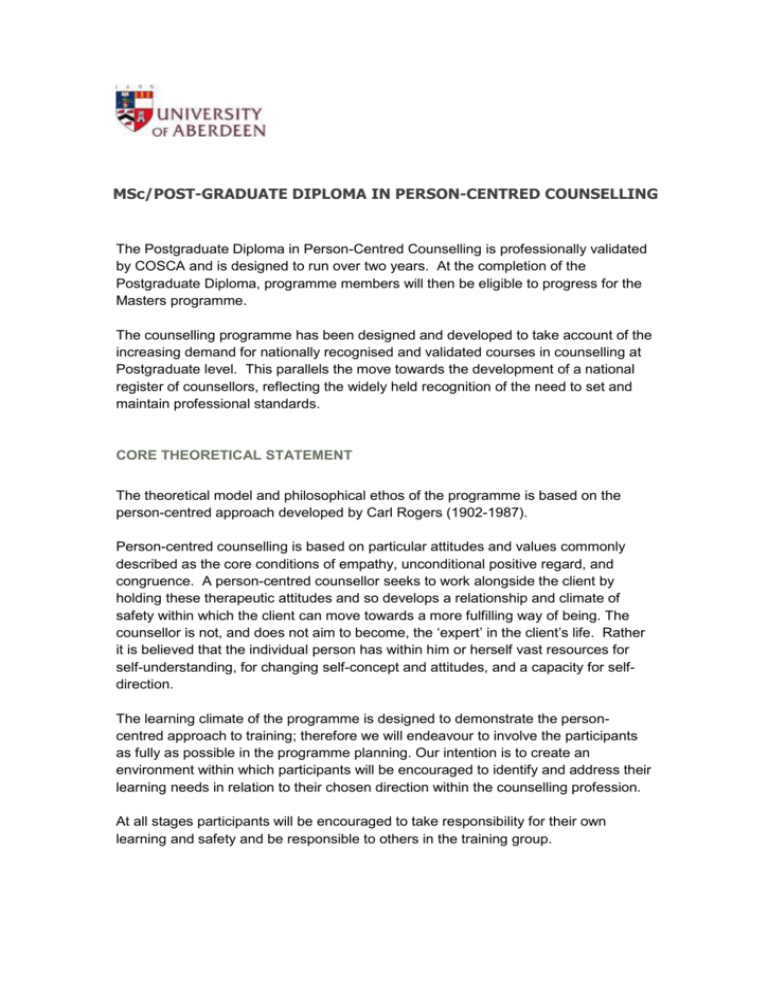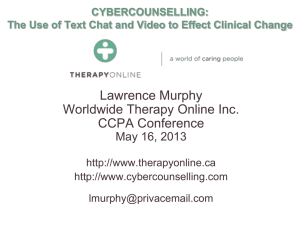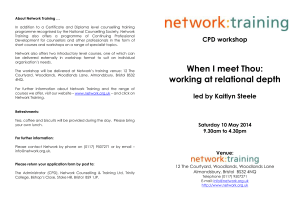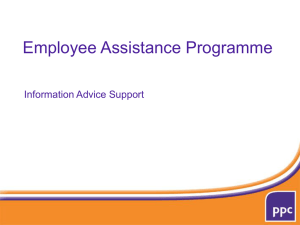Person-Centred Counselling
advertisement

MSc/POST-GRADUATE DIPLOMA IN PERSON-CENTRED COUNSELLING The Postgraduate Diploma in Person-Centred Counselling is professionally validated by COSCA and is designed to run over two years. At the completion of the Postgraduate Diploma, programme members will then be eligible to progress for the Masters programme. The counselling programme has been designed and developed to take account of the increasing demand for nationally recognised and validated courses in counselling at Postgraduate level. This parallels the move towards the development of a national register of counsellors, reflecting the widely held recognition of the need to set and maintain professional standards. CORE THEORETICAL STATEMENT The theoretical model and philosophical ethos of the programme is based on the person-centred approach developed by Carl Rogers (1902-1987). Person-centred counselling is based on particular attitudes and values commonly described as the core conditions of empathy, unconditional positive regard, and congruence. A person-centred counsellor seeks to work alongside the client by holding these therapeutic attitudes and so develops a relationship and climate of safety within which the client can move towards a more fulfilling way of being. The counsellor is not, and does not aim to become, the ‘expert’ in the client’s life. Rather it is believed that the individual person has within him or herself vast resources for self-understanding, for changing self-concept and attitudes, and a capacity for selfdirection. The learning climate of the programme is designed to demonstrate the personcentred approach to training; therefore we will endeavour to involve the participants as fully as possible in the programme planning. Our intention is to create an environment within which participants will be encouraged to identify and address their learning needs in relation to their chosen direction within the counselling profession. At all stages participants will be encouraged to take responsibility for their own learning and safety and be responsible to others in the training group. PROGRAMME AIMS AND OBJECTIVES The overall aim of the programme is to offer a sufficiently safe, supportive and challenging learning environment that will enable students to develop and demonstrate those personal qualities and professional skills deemed necessary for competent and reflective practitioners within a person centred framework. Selfawareness, counselling theory, practice and research are integrated to a level that enables course members to engage with therapeutic processes in a range of counselling relationships. The programme aims to enable students to: Understand the philosophy, theory, and research concerning the personcentred approach. Develop a high level of awareness of and competence in person-centred counselling relationships. Understand person-centred therapeutic processes. Develop awareness of their professional developmental needs and of the importance of the full use of counselling supervision. Evaluate the importance of personal development in relation to training as a person-centred counsellor. Consider the effect of personal experience, values, and attitudes on the counsellor’s practice. Develop critical understanding of the place person-centred counselling occupies in the field of counselling and the role counselling plays in society as a whole. Place individual counselling practice within a sound ethical framework as outlined in the BACP Ethical Framework for Good Practice in Counselling and Psychotherapy and the COSCA Statement of Ethics and Code of Practice. PROGRAMME STRUCTURE The Postgraduate Diploma will run over two academic years and will provide 400 student/tutor contact hours covering theory, observed practice, personal development, and group supervision as required by COSCA. Individual supervision and personal tutorials can be added to this total. Programme members are required to complete at least 180 hours of supervised counselling practice within a suitable practice setting prior to graduation. COSCA guidelines state that 100 of these hours should be completed within a period of 18 months of the end the diploma programme. In line with COSCA policy and that of the School of Education the Postgraduate Diploma should be completed within five years. The 2014-2016 programme will meet on Tuesdays from 10am - 5pm. However, the programme will begin with a four-day intensive week and will end with a three-day residential meeting. In addition, a residential weekend will be included around the half way mark of the programme. This is arranged by the programme members at a time and place to suit everyone. The four courses or modules that make up the postgraduate diploma and that must be successfully completed prior to graduation are: Course 1 - Foundations of Person-Centred Counselling Course 2 - Therapeutic Process in Person-Centred Counselling Course 3 - Development of Professional Counselling Practice Course 4 - Reflexivity and Professional Enquiry Although the programme is structured on a modular basis it is conceptualised as a comprehensive experience. The programme has four strands running throughout and linking the separate modules: • • • • Counselling Relationship and Therapeutic Process Counselling Theory and Research Personal Development Professional Development These four components are present in, and weave throughout, the programme forming its foundation and bringing about an integrated whole. The core content of the programme will be presented at different times and in different ways throughout in order to well integrate theory and practice with personal and professional development. METHODS AND APPROACHES TO LEARNING A wide variety of methods and approaches to learning will be used, these include: Experiential workshops Seminars and lecturers Community Meetings Personal Development Groups Individual and group supervision Observed practice Study groups` Audio-recordings of counselling sessions Private study with substantial reading Personal journaling These training methods will run through each module to provide different opportunities for enhancing personal awareness and counselling practice. Community Meetings and Personal Development Groups will offer the opportunity to experience the offering and receiving of empathy and unconditional positive regard as well as offering the opportunity to explore personal and inter-personal issues. Experiential workshops will offer the chance to work in small groups on specific issues. Observed practice sessions will involve counselling fellow group members in order to experience and explore the roles of counsellor and client. PROGRESSION TO MSC The requirement for the student to progress from the Postgraduate Diploma stage to the Master’s stage is the achievement a CAS mark 9 across all 4 courses of the programme (120 credits). The Master’s stage of the programme consists of the participation on the ‘Work Based Project and Dissertation Course’ (WBP&D). The WBP&D course is a 60 credit course at SCQF level 11. The course supports the student to frame, specify, plan, carry out and report an academic or work-related research-based investigation or development to complete a Master’s degree. The WBP&D course requires autonomy and sustained independent research. FOR FURTHER INFORMATION CONTACT: Julie Anderson Programme Secretary, MSc in Person-Centred Counselling, School of Education, MacRobert Building, King's College, ABERDEEN - AB24 5UA Tel: +44 (0) 1224 274673 E-mail: pgecounselling@abdn.ac.uk




